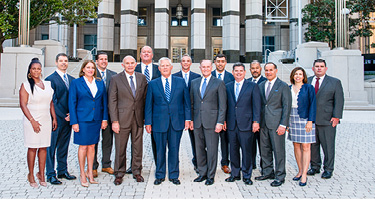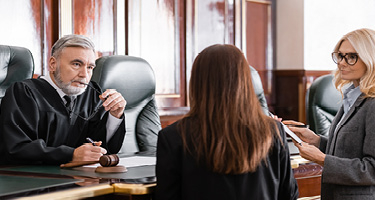It’s the rare businessperson who wants to have an important issue or, worse, a company’s fate decided by a judge or jury. The vast majority of lawsuits are settled before it comes to that. But trial happens, sometimes with billions or hundreds of millions of dollars at stake.
Given how unfamiliar this territory can be, we spoke with MoloLamken LLP partners Steven Molo, one of America’s leading trial lawyers, and Sara Margolis, a rising courtroom star, to learn how a party in a high-stakes trial might improve its chances of success, or, at least avoid disaster.
The overwhelming number of civil lawsuits in America, including high-stakes business disputes, settle given the risk and the expense. What is it that causes a party—plaintiff or defendant—to say we understand all that, but we’re going to trial?
Steven: Usually, it’s when the parties have fundamentally different views on the value of a case. A variety of factors influence those views. Certainly, the evidence developed in fact and expert discovery is important. But also important are the party’s financial circumstances, its view of what type of trial—and possibly decision—it will get from this judge, and if it’s a jury trial, what the jury research has shown.
Sara: Sometimes, too, a party will have great confidence in its position on a key legal issue it lost earlier in the case. It might be something decided on summary judgment or on a motion to dismiss. Or it could be on how the judge has said she will instruct the jury. A party might believe the risk of a trial loss is substantially mitigated by the likelihood of an appellate victory or at least a favorable settlement after trial in light of the appellate issue. It can be a big bet. But some clients are willing to make it.
Is there a type of case—in terms of the underlying dispute—that’s more likely to go to trial?
Sara: Not really. It can be an antitrust case, a fraud case, a contract dispute, shareholder or bondholder disputes, an IP dispute. You don’t see many class actions tried, but recently we won a significant jury verdict for the plaintiff class in a securities fraud suit.
I know sometimes you are brought in very late in a case, maybe after it’s been litigated for years, to represent a client at trial. How does that come about?
Steven: Sometimes a client will recognize that a case that’s been plodding along for three or four years with discovery and motions is actually going to be tried, and there’s a lot at stake. They can look at their lead lawyer, who may have done a fine job up to that point, and realize this is not someone with much, if any, experience trying cases before a jury or a judge. That can be a sobering moment.
When you think about it, that makes sense. Not many cases get tried, so not many lawyers have tried many cases.
Clients sometimes find us and say, “Can you come in and work with our existing lawyers who we love, but who just aren’t that experienced with trials?” We do that regularly.
Sometimes the firm itself will approach us and say, “We’ve gotten it this far, but adding your firepower can make a real difference.” Once in a while, a client will want to replace its law firm over a disagreement concerning trial strategy or whether the case should be settled.
Ultimately, a client has to feel comfortable and believe they have an experienced fighter leading the charge and a competent, well-structured team that can take the case from where it is to a win.
You say a “competent, well-structured team.” What do you mean?
Sara: You can have a great lead trial lawyer, but in a complex, high-stakes case, there’s too much going on for that person to be effective without other strong players focusing on discrete aspects of the trial. For example, we might have a lawyer focused on damages, another focused on liability experts, another focused on legal issues and jury instructions. They need to go deep in their assigned areas but also have in mind the broad strategy and be aware of what’s going on in other aspects of the case.
Steven: And the team should be diverse.
Sara: Right. Diversity broadens your perspective and provides strength. Not everyone looks at the world, or the issues you are dealing with, the same way. Diversity isn’t some catchphrase. It leads to better outcomes.
What you describe sounds like a highly structured, almost military approach. Can you provide a sense of what that actually looks like at a trial?
Steven: We believe the case should be tried before we ever set foot in the courtroom. By that, I mean we’ve mapped out the testimony of our witnesses and the cross-examination of opposing witnesses, including the exhibits we’ll use with each. We’ve thought through the evidentiary issues. And we do this collaboratively to capture the best thinking.
Sara: We have our own system for organizing that. The same system carries over from trial to trial, so expectations of team members are clear. We’re not reinventing the wheel with each case. We’re big on white boarding as a tool to spark creativity and collaboration but bring discussions to a concrete point.
Steven: We have dinner as a team in a conference room at 7 p.m. every day after court. There’s an agenda covering what needs to be done based on our plan and the day’s developments.
Wow. That sounds rather rigid. Aren’t trials supposed to be dynamic?
Steven: They are dynamic. But having an experience-based system and a plan, we can better address courtroom twists and issues as they arise.
You mentioned jury research. What exactly do you mean by that?
Sara: There are consultants who, under the confidentiality protections of the attorney-client privilege and work-product doctrine, run various exercises—surveys, focus groups, mock trials—and help develop themes and assess likely juror reactions. We’ve worked with many of the top people throughout the country.
Do you do that with bench trials?
Sara: Sometimes, in a fashion. We might bring in one or more retired judges to have a look and get their thoughts.
What about graphics? They seem to be used extensively at trials and hearings.
Steven: Good graphics are essential. There are studies showing 85% of communication is non-verbal. And we live in a smart phone/Twitter world. People’s brains are trained to receive and process information and form beliefs quickly—through displays of information, not just the spoken word. We account for that. We work with outstanding graphics consultants who we’ve known for years to hone our messaging.
Sara: Graphics are something most lawyers get wrong. They use too many. They are jammed with too much information. They don’t understand color. It’s usually death by PowerPoint.
How important is subject matter expertise?
Sara: At this stage, advocacy skills are far more important than subject matter expertise. The legal issues have been fleshed out. We usually have a subject matter expert as part of the trial team. But the lawyers’ job now is to persuasively present the important evidence within the framework of the applicable law.
Are there aspects of a trial that lawyers without a lot of courtroom experience tend to struggle most with?
Steven: Cross-examination is probably the most difficult skill to develop. Preparation is critical, but an effective cross-examiner must respond and adjust in the moment. It takes lots of experience with inevitable failures along the way to excel at it. People think success as a prosecutor equates to success as a private lawyer. It helps, but prosecutors often are not required to cross-examine many witnesses, so that’s not necessarily true.
Another common struggle is seeing the forest for the trees. People become so immersed in facts developed over the years that they won’t focus on the few that matter most. Often, it’s a lack of confidence or a “cover-your-backside” mentality—two documents can prove the point but let’s introduce fifteen, so we won’t be criticized. What’s lost is the fifteen can confuse or bore the judge or jury. Less is often more.
Persuasion is about striking an empathetic chord with your audience and telling a simple story that has the equities as well as the facts favoring your side.
What about working with witnesses?
Sara: Many litigators are experienced in preparing witnesses for depositions. But depositions, at least those taken in discovery and not for the purpose of presenting trial testimony, are quite different from trial testimony. A trial witness will affirmatively tell the client’s story, or part of it, and different communication skills are required. An experienced courtroom advocate shapes the witness preparation to account for that.
Also, there’s a tendency among less experienced lawyers to want to tell the whole story—or at least a good part of it—with each witness. They fail to recognize that a well-presented case at trial is like a mosaic, with various pieces fitting together to form the big picture.
Other than the obvious benefit of courtroom expertise, are there advantages to using a litigation specialist firm like yours to try a major case?
Steven: Certainly, when we are hired, it sends a message to the other side that the client is ratcheting things up and ready to do battle from the trial court all the way to the Supreme Court, if necessary. That can be one factor in reaching a favorable settlement.
Additionally, we are independent. A large percentage of our clients come to us to deal with a specific serious matter. Without a corporate practice, we lack the institutional ties that can sometimes—consciously or unconsciously—influence advice and strategy. Our advice about whether to proceed to trial or settle in a given range is based on our studied view of that case and the client’s articulated goals.

























